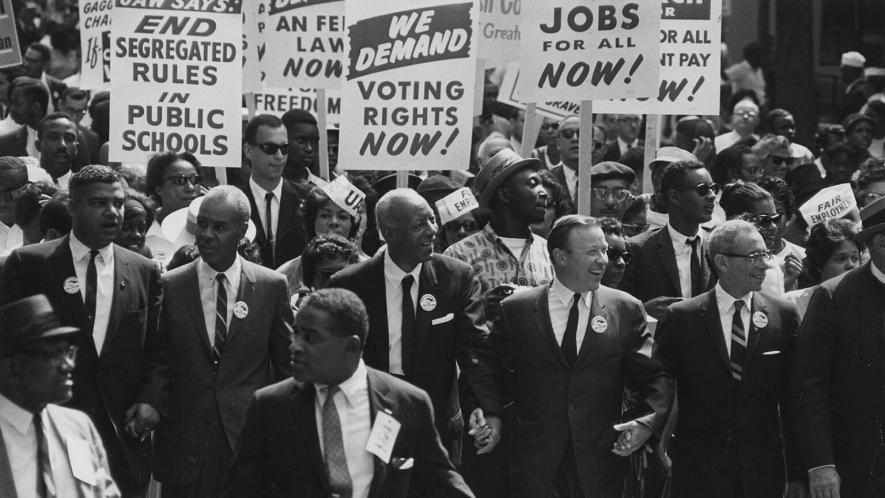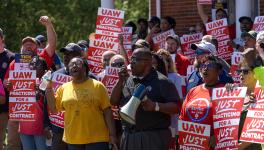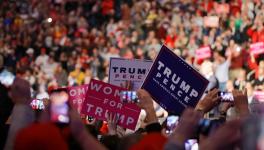US: Building a Working Class Movement After Trump’s Win

March on Washington for Jobs and Freedom - August 28, 1963. Civil Rights March on Washington, D.C. [Roy Wilkins, Executive Secretary of the National Association for the Advancement of Colored People; A. Philip Randolph, Brotherhood of Sleeping Car Porters, American Federation of Labor (AFL), and a former vice president of the American Federation of Labor and Congress of Industrial Organizations (AFL-CIO); Walter P. Reuther, President, United Auto Workers Union; and Arnold Aronson, Secretary of the Leadership Conference on Civil Rights.]
There are a handful of key terms that Democratic Party-leaning and centrist mainstream media use to describe president-elect Donald Trump, chief among them being “authoritarian”.
Yet when analyzing the history of the United States from a working class, movement-based lens, it becomes clear that the entire country has been deeply shaped by the “authoritarianism” of the ultra-wealthy elites. According to socialist journalists and left leaders Brian Becker and Eugene Puryear, Trump is not an outlier in this history.
Where does that leave US-based movements of poor, working, and oppressed people, who seek to make changes in the interests of the vast majority of the country?
“There’s going to be a time in America where the question will be, do people give up their agency and just acquiesce to the worst possible policies, or do people rise up and create a social crisis?” asks Puryear in a recent discussion with Brian Becker, which was aired on The Socialist Program.
Read part three of the full interview, which has been lightly edited for clarity, below:
BB: In the 1960s, and I would say really between 1955 and 1970, there was what we have called a Civil Rights revolution. It didn’t seize the means of production. It didn’t overturn property relations fundamentally in the United States. But it led to a massive change: political, social, economic and cultural change in the United States.
As a result of the uprising of Black America, which then also contributed to the uprising of women, and then the gay movement and the disabled movement, all of these mass movements for social change, you had social economic reforms and concessions granted by the ruling class.
The ruling class never wanted to do all these things. They did it in spite of themselves, because of the struggle.
EP: Even though, as you say, the Civil Rights movement was not necessarily seizing the means of production, it was infringing upon the rights of capital, and it was raising the idea that there are things that are more important than profit and that in certain circumstances, business owners shouldn’t be able to do whatever they want to do with their property. The Civil Rights Act was starting to say [to corporate elites], that in certain circumstances, we might just force you to do something.
When you’re challenging the entrenched power structure of the Jim Crow South, it wasn’t just racism, but the Jim Crow Solid South political system. These people were the most anti-communist, the most pro-business, many of them deeply anti-Semitic, anti-Catholic, reactionary people. Having a Solid South political bloc helped drag the whole political scene to the right. Once the Civil Rights movement started to break that up, the political possibilities for progressive policy became bigger, because they had broken up the traditional bridle that was put on the political system by the capitalist class with the Solid South.
The Civil Rights movement, the consumer rights movement, the environmental movement, the women’s movement, were starting to say that in certain circumstances, you shouldn’t just be able to do whatever you want to do with your property. The government should be able to force you to do certain things that are either morally right and just or overall for the common good of society in a social and economic way.
For capitalism, that’s a slippery slope. I think it’s an important factor when we understand the reality of what this actually meant to the capitalist class. To us, to average people, it seems small, but to the people who have so much wealth and so much privilege that is only achieved on the backs of others, the more the masses of people are empowered to pursue whatever their agenda may be, the more they fear that agenda could turn against them.
BB: The word democracy does not appear in the US Constitution that was adopted in 1787 in secret by a group of very rich slave owners and merchants.
Women could not vote. Most Black people were enslaved. White men who did not own property did not get the vote until 1828. There was no Bill of Rights in the original US Constitution.
It’s always been an authoritarian government. It is, in fact, a dictatorship. It’s a dictatorship of property. It’s a dictatorship of wealth.
On the left, we have to completely reject these liberal labels that Trump is, for the first time in American history, a strongman and an authoritarian government. And that those decrepit American people voted for him, so they gave him a permission slip to create an authoritarian government. Well, what was slavery? What was Jim Crow? What were the Japanese internment camps? What was the fact that when workers went on strike, they would be routinely shot down by the bosses, along with private goon squads, along with the police forces? Everything about capitalist rule is authoritarian.
EP: Under [second US President] John Adams, under the Alien and Sedition Act, they arrested a number of printers and publishers. Just making personal insults in a newspaper was enough to be arrested under the Alien and Sedition Acts under John Adams, which are put forward because there was a fear among certain elites in the US government that people in the United States were too excited about what was happening with the French Revolution and that they may get carried away and bring the guillotine to the elites here in the United States.
A lot of the Alien and Sedition Act is gone, but one part that’s not gone is the Alien Enemies Act. Trump says he’s going to use the Alien Enemies Act to facilitate his mass deportation campaign. I actually don’t think I’ve heard one Democrat say anything about the Alien Enemies Act whatsoever, which, by the way, was one of the key authorities used to intern Japanese-Americans.
[Democrats] keep saying all these things about the Insurrection Act. The Insurrection Act was not written by Hitler. It was written by many American founding fathers, in the context of the Congress of that time, which was trying to bring together all these various things they had been doing called the militia acts, primarily because the United States was soundly defeated by an army of Indigenous people in a battle. It freaked out all of the original elites of America. So [the elites] started to find a way to put the militias under federal control and bring them together to have a stronger instrument to wage a genocidal war against Indigenous people.
I haven’t heard one Democrat say, let’s get rid of the Insurrection Act. So you’re saying, well, Trump is Hitler, he’s fascist. All the things [Trump] is saying that he’s going to do, he’s actually rooting them in US law and in US tradition.
Liberalism in the United States has become essentially just the handmaiden to a political discourse that’s dominated by the far right. They ape the far right. It’s not an accident, though, that they ape the far right, because liberalism is an ideology of a wing of the bourgeoisie.
The reality is the further right you go, it’s not a problem for the richest people, because they actually get richer. Further right just means more pro-capitalist, more money for rich people, more profit over people.
But the further you left you go, the more it means that you’re infringing upon the rights of rich people to do whatever they want, and saying that average everyday people should have more say in how the economy is run, how society is governed, what rights individuals have. Rich people just aren’t going to go for that.
BB: As soon as something goes wrong for [the Democrats], they blame the working class.
We have to reject people, including some people on the left, who say, look at how backward the working class is in the United States. That’s not the answer. We have to build a movement against capitalism, and it’s not enough to just be anti-Trump.
If we take a policy of having to fight Trump, that Trump’s an authoritarian, that’s going to go nowhere. We need a working class program. We need to demand that the trillion dollars a year spent for death and destruction and for imperialist wars be used for flood relief or hurricane relief. Many people in the south don’t have flood insurance or wind insurance right now and can’t rebuild their homes. One half of all bankruptcies in the United States are because people can’t pay their doctor’s bills.
A working class program that speaks to the needs of the working class against capitalism, that’s the way to fight the right. Not to hand-wring and denounce and condemn people who happen to vote for Trump. The reason Trump won was no other reason than the failure of the capitalist Democratic Party, which in so many ways looks like the capitalist Republican Party.
EP: Trump won Nebraska, but 73% of people [in that state] voted in favor of mandatory paid sick leave of 5 to 7 days. You had seven out of the ten of the abortion referendums that were on the ballot, to enshrine the right to abortion, succeed. Many of them were in “deep red” states. And in Florida, where [the abortion rights ballot measure] didn’t succeed because you had to reach the 60% threshold, you still had 57% [vote for it], a very large majority of people. Alaska, not necessarily known as the world’s most progressive state, overwhelmingly passed something called measure one, which will increase the minimum wage to USD 15 an hour and require 40 hours of paid sick leave, and very importantly, will ban captive audience meetings.
There’s actually less divide on a number of core issues than we think. But there are some issues where there are deep divides, and those issues tend to be the issues that are played on the most by the two major political parties to divide working class people and to split them up into different camps that they can exploit for their own vote catching.
There’s going to be a time in America where the question will be, do people give up their agency and just acquiesce to the worst possible policies, or do people rise up and create a social crisis?
Because the whole issue with COVID-19, is there was the potential for a social crisis, and all of a sudden they’re handing out checks to people. The issue of the Civil Rights movement, there was a social crisis. All of a sudden they’re dismantling Jim Crow. The issue of the sit down strike at General Motors in 1937 made the steel companies say, you know what, we don’t even really want that smoke with these unions. So here’s a contract.
When you create a social crisis, you have the ability to take gains to use that as leverage to move forward your agenda. But if you want to go beyond that, you actually have to take power. It’s not just about having leverage, not just about having influence. It’s about power, which means changing our system entirely, displacing those who think that profit should be before people and making sure our governing structures empower people over profit.
BB: I couldn’t agree with you more. People can make the change, Eugene. All of those things that you talked about, the labor movement’s gains, unemployment insurance, the Wagner Act, the right to unionize, the end of segregation, the right to abortion, the right to marriage equality. None of those were gifts from capitalist politicians. Those were from real struggles of the people. But we need a radical transformation in society so that all of these gains can never be reversed.
All of the needs of the working class and all of the people in society can be met. These are achievable things. This is not utopian. The only thing that inhibits and obstructs this reality from coming into existence is the capitalist system. But we, the people, have to build that movement.
Read Part 1 here and Part 2 here.
Get the latest reports & analysis with people's perspective on Protests, movements & deep analytical videos, discussions of the current affairs in your Telegram app. Subscribe to NewsClick's Telegram channel & get Real-Time updates on stories, as they get published on our website.
























